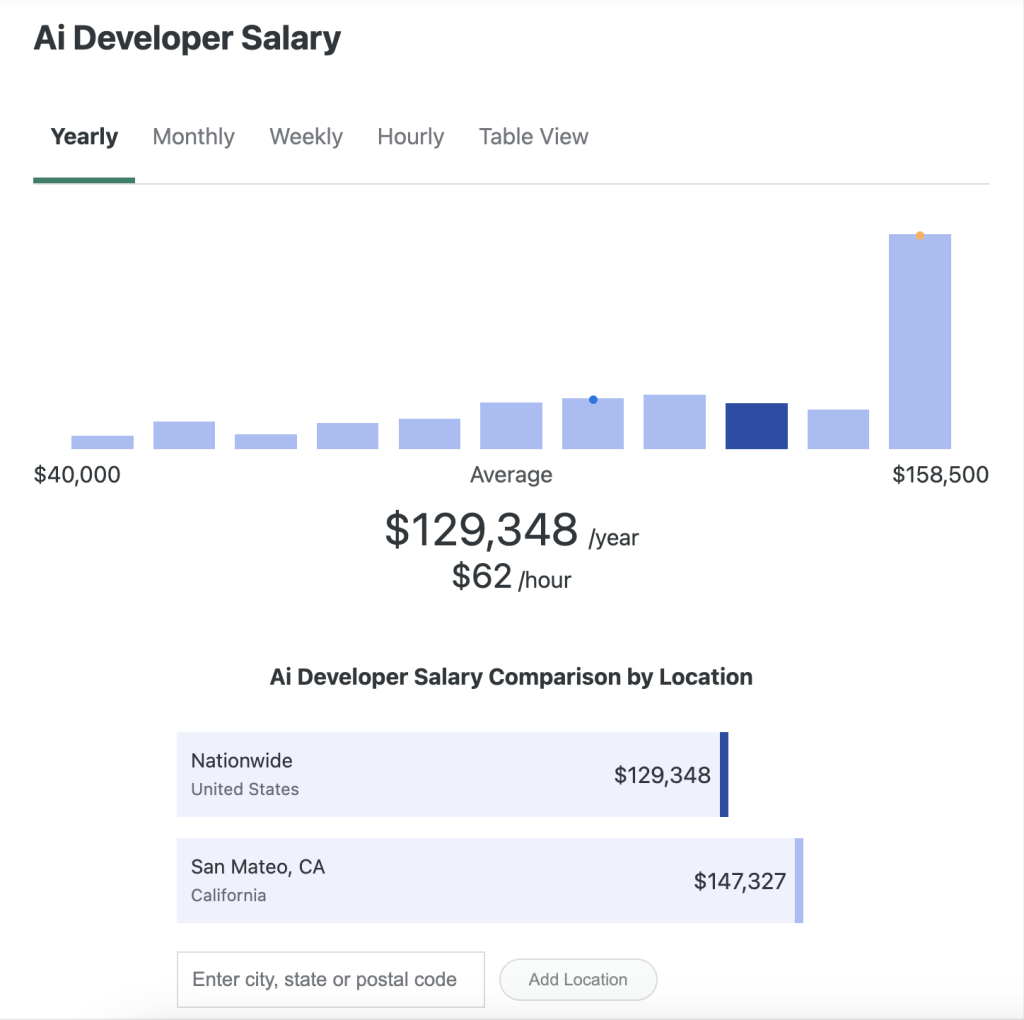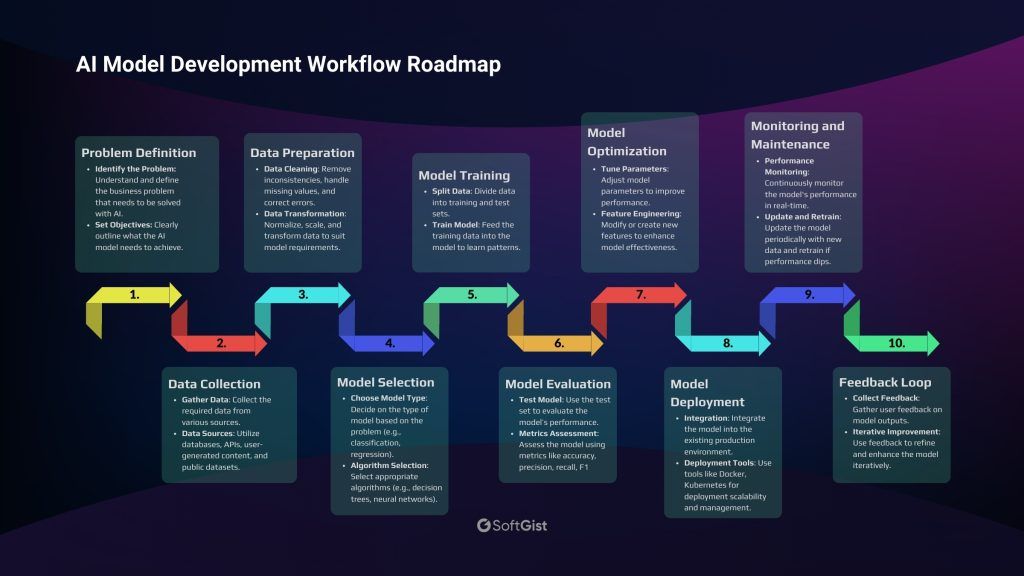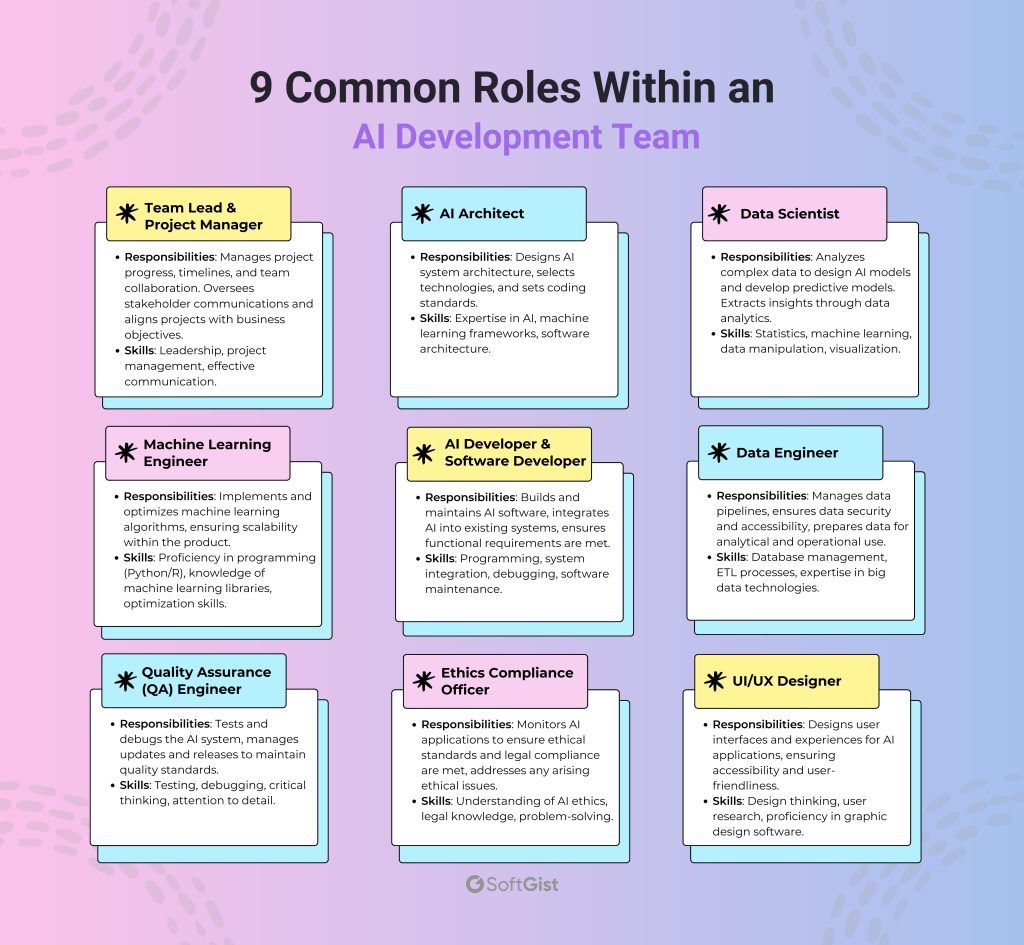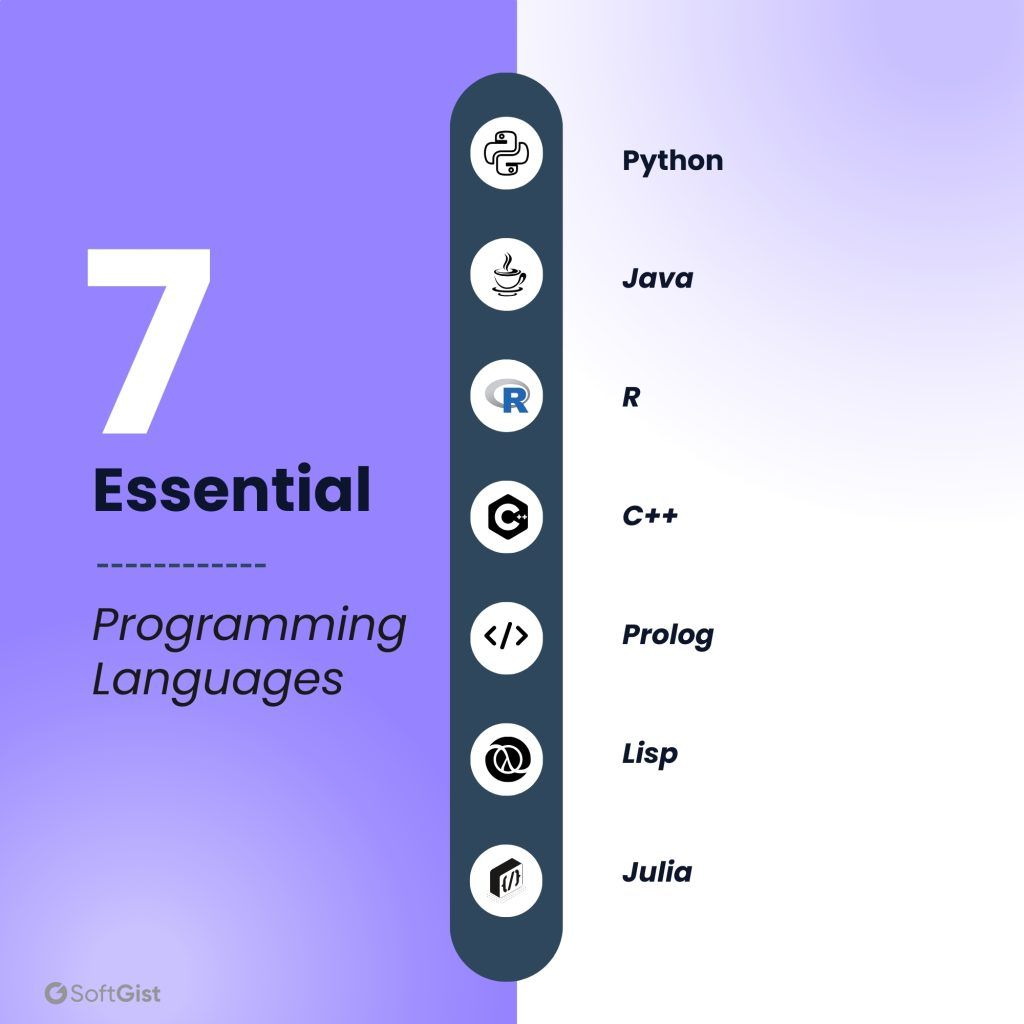How to Become a Professional AI Developer? [2025]
Updated December 14, 2024
Published April 22, 2024
![How to Become a Professional AI Developer? [2025]](https://cdn.sanity.io/images/isy356iq/production/9fd66e97b4189371f4660b6cf7cea90fbc102db3-1200x800.jpg?h=260)
If you are interested in solving problems, designing, developing, and fine-tuning algorithms, you should consider a career in AI development. This field combines creativity with technology and also offers excellent pay, making it a perfect choice for you.
Data shows that the average annual salary for an AI Developer in the United States is $129,348. AI developers use their skills to create and improve algorithms that enable computers to learn and make decisions.

via ZipRecuiter
If you are thinking about getting into the field of artificial intelligence and don’t know how to start or need reassurance that you are heading in the right direction, then you are in the right place.
By the end of this guide, you will have a comprehensive understanding of how to begin your journey and the resources that will help you become a professional AI developer.
Let’s dive in and see how you can turn this exciting idea into a reality!
Understanding the Job of an AI Developer
Let’s begin with understanding what an AI developer is? AI developers engage in a wide array of complex tasks that involve various aspects of artificial intelligence such as machine learning, natural language processing, robotics, and data analysis.
They are involved in creating systems that can understand and generate human language, interact with users, and even make decisions in complex scenarios like driving autonomous vehicles or managing financial investments.
As an AI developer, you’ll use programming languages like R, Java, and Python to build and integrate AI capabilities into various software applications —— more on that later.
The role of an AI developer is crucial in advancing these technologies and finding innovative solutions to some of the most challenging problems facing industries today.
Thus, the job combines elements of programming, data science, and software engineering, focusing heavily on innovation and problem-solving. Whether it’s improving existing technologies or pioneering new ones.

What to Expect When Working as an AI Developer
Embarking on a career as an AI developer involves understanding the multifaceted and dynamic responsibilities associated with this role. Here’s a structured overview of what to expect:

Core Responsibilities
AI developers are instrumental in designing and implementing algorithms that empower machines to perform tasks typically requiring human intelligence. Their key duties include:
- Designing and building AI models: Developers design the architecture of AI systems, select suitable data models, create algorithms, and ensure scalability.
- Programming and coding: Using languages such as Python, Java, and R, AI developers write complex code that integrates AI functionalities into software applications.
- Data handling and processing: Developers manage the collection, cleaning, and organization of data, and perform analyses to extract insights crucial for training AI models.
- Training and testing models: This involves training AI models with large data sets, testing, and tweaking them to enhance their accuracy and efficiency.
- Implementation and deployment: Developers deploy AI models into production, integrating them into existing systems and ensuring seamless operation within broader IT infrastructures.
- Monitoring and Maintenance: After deployment, developers monitor AI systems to ensure proper function, performing regular updates and model refinements.
Collaborative and Advisory Roles
AI developers work closely with data scientists, software engineers, and project managers. They align AI strategies with business goals and ensure AI solutions effectively solve real-world problems. They also advise stakeholders on the impacts and benefits of AI implementations.
Ethical and Regulatory Compliance
AI developers consider the ethical implications of their projects, ensuring AI applications adhere to legal and ethical standards. This includes addressing data privacy, bias in AI models, and ensuring transparency.
Continuous Learning and Adaptation
The AI field is constantly evolving, necessitating that developers stay current with the latest research and technological advances. Ongoing education is essential for maintaining effectiveness and fostering innovation.
Overall, a career as an AI developer is not only technically demanding but also requires collaborative skills, ethical consideration, and a commitment to continuous learning. It is a challenging yet rewarding profession that demands a high level of dedication and adaptability.
Essential Programming Languages for AI Developers
To thrive as an AI developer, it’s essential to be proficient in multiple programming languages, each serving distinct roles in various aspects of AI development.

Here’s a quick overview of seven critical programming languages, their applications, and examples of companies that leverage them:
Python
Python is favored by AI for its simplicity and the powerful libraries it supports, such as TensorFlow, Keras, and PyTorch, which are crucial for developing complex neural networks. For instance, TensorFlow is used to model consumer behavior from historical data. Google notably uses Python across various AI initiatives, including voice and image recognition technologies. Additionally, they offer free online Python classes for coding enthusiasts.
Java
Java offers speed and reliability, making it ideal for scalable, large-scale AI systems. It supports several machine learning libraries like Deeplearning4j, used for real-time fraud detection in banking. LinkedIn relies on Java for managing massive datasets and real-time data processing in its AI applications.
R
R excels in statistical analysis and data visualization, making it a top choice for data-heavy AI tasks. It’s widely used in academia for machine learning and statistical computations. For example, Twitter utilizes R for data analytics to improve user engagement and advertising strategies.
C++
Known for its efficiency in time-sensitive calculations, C++ is used in performance-critical AI applications, such as gaming AI and robotic controls. Adobe integrates C++ in its software for AI-driven features like advanced image processing.
Prolog
Suited for AI tasks requiring complex logic, such as expert systems, Prolog supports applications like automated reasoning in legal or medical diagnosis systems. IBM has historically used Prolog for its early AI applications and expert systems development.
Lisp
Lisp has played a pivotal role in AI development, particularly for its prototyping capabilities and handling of symbolic information, useful in pattern recognition and natural language processing (NLP). NASA has employed Lisp to develop intelligent systems for spacecraft control and simulation.
Julia
Julia is designed for high-performance numerical tasks, suitable for machine learning and high-frequency trading algorithms. For example, BlackRock has experimented with Julia to optimize its quantitative investment models.
Each language is chosen based on specific project requirements, including performance needs and ease of use, aligning with the unique demands of different AI domains.
Where to Apply for Your Next Big Opportunity
Many leading companies across various industries actively hire AI developers to enhance their technological capabilities and drive innovation.
Here are ten prominent companies that regularly seek AI developers, along with insights on where you can find these job opportunities:
- Google – As a leader in AI, Google hires developers for projects involving search algorithms, machine learning models, and AI-driven products like Google Assistant. Explore these opportunities on Google Careers.
- Amazon – Utilizing AI in retail algorithms, Alexa, and AWS AI services, Amazon offers a range of AI development roles. Find these positions on the Amazon Jobs page.
- Meta (Facebook) – Meta is deeply involved in developing AI for enhancing social media interaction, content moderation, and creating virtual environments. Start your search on the Meta Careers page.
- Microsoft – Known for its AI innovations in Azure and Cortana, Microsoft provides various AI roles, accessible through the Microsoft Careers site.
- IBM – IBM employs AI developers for Watson and other projects across multiple industries. You can check their AI opportunities on the IBM Careers website.
- Apple – Apple recruits AI specialists to improve technologies like Siri and facial recognition features. Opportunities can be explored via Apple Jobs.
- NVIDIA – Renowned for GPUs powering AI computations and its work in autonomous driving tech, NVIDIA’s AI positions are listed on the NVIDIA Careers page.
- Tesla – A leader in AI for autonomous vehicles, Tesla seeks developers skilled in deep learning and computer vision. Find more information on the Tesla Careers site.
- Intel – Intel hires AI developers for both hardware acceleration and software application projects, including AI-driven neuromorphic computing. Explore these roles at Intel Careers.
- OpenAI – Dedicated to ensuring that artificial intelligence benefits all of humanity, OpenAI offers roles across various AI applications. Their job listings can be viewed on the OpenAI Careers page.
These companies represent just a slice of the opportunities available in the AI field. For broader job search options, consider platforms like LinkedIn and Indeed, and networking within AI and tech community events, and keeping an active profile on professional social media platforms can also significantly enhance your job search efforts.
How to Mastering the AI Developer Job Interview
Securing a job interview for an AI developer position is a significant achievement. To ensure you make a lasting impression and increase your chances of landing the job, here are some tips and strategies:
Preparation for the Interview
- Understand the Role and Company: Research the company’s culture, recent projects, and the specific role you’re applying for. This knowledge will help you tailor your responses and show genuine interest in the position.
- Practice Common Interview Questions: Prepare for both technical and behavioral questions. Common technical questions might include topics on machine learning algorithms, programming languages like Python or R, and past project experiences. Behavioral questions may explore your problem-solving skills, teamwork, and adaptability.
- Review Your Projects: Be ready to discuss your previous work in detail. Highlight projects where you applied AI technologies and explain your role, the technologies used, and the outcomes. This demonstrates your hands-on experience and ability to apply AI in real-world scenarios.
During the Interview
- Showcase Soft Skills: While technical expertise is crucial, demonstrating soft skills such as creativity, problem-solving, and effective communication is equally important. These qualities show that you can work well in a team and adapt to new challenges.
- Demonstrate Your Coding Skills: If the interview includes a practical coding test, read the problem carefully and plan your approach before you begin coding. Comment your code to make it clear and maintainable, which reflects good coding practices.
- Engage with the Interviewer: Ask insightful questions about the team, projects, and technologies used by the company. This shows your enthusiasm for the role and helps you understand if the company is the right fit for you.
After the Interview
- Recruiter Touchpoint: Reach out to your recruiter to provide feedback on how the interview went from your perspective. This is also a chance to reaffirm your interest in the position and inquire about the next steps in the hiring process.
- Stay Proactive: While waiting for a response, continue to engage in activities that enhance your AI skills and knowledge. This proactive approach will benefit you whether you get the job or need to pursue other opportunities.
Additional Resources
- Online Platforms: Utilize platforms like LeetCode and HackerRank to practice coding problems commonly asked in AI interviews.
- Stay Updated: Follow AI news and advancements through websites like Towards Data Science and ArXiv to keep your knowledge current.
- Mock Interviews: Consider scheduling mock interviews with platforms like Pramp or Interviewing.io, where you can practice coding interviews in real-time with peers or AI.
By following these guidelines, you can approach your AI developer job interview with confidence, showcasing both your technical abilities and your readiness to contribute effectively to potential employers.
Final Thoughts
A career in AI development is not just a smart choice—it’s a step into a future where your work will drive innovation and progress. With a solid foundation in programming and a commitment to ongoing learning, you can join the ranks of professionals who are shaping the world with artificial intelligence. So why wait? Begin your journey today, and take your place at the forefront of this exciting field.
Frequently Asked Questions
Share This Post
Alex Powell
Alex Powell is a senior tech and business media writer with a passion for breaking down complex tech topics into easy-to-understand information. He holds a degree in Business Administration and a master's in Journalism. When he's not writing, Alex enjoys hiking and reading books.
Allow cookies
This website uses cookies to enhance the user experience and for essential analytics purposes. By continuing to use the site, you agree to our use of cookies.
